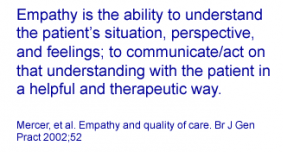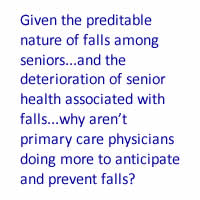May 6th, 2011 by StevenWilkinsMPH in True Stories
1 Comment »

I had a WOW experience yesterday when I accompanied my wife to interview a new doctor for her. As some reader may know she is being seen by specialists at MD Anderson Medical Center in Houston for Stage IV lung cancer. She has not had a local oncologist for the past 6 years…but she does now. And we both love this guy!
You need to understand that I have been very underwhelmed by the local oncologists I had met up till now. I am sure they were clinically proficient…but as a group not a one could muster a smile….or any sense of interest or curiosity in my wife’s medical condition. I held out little hope that this new doctor would be any different.
After being ushered into the exam room, a Physician’s Assistant came into the room to get smart about my wife’s history and records (which she brought). Three things surprised me about the PA. 1) She was incredibly thorough actually reading the radiology reports and reflecting with my wife on what she learned, 2) her empathy – as she read the reports she actually used terms like “bummer” when she read how my wife developed pneumonia during her treatment, and 3) she faithfully summarized the results of her review to the doctor before he came in. In other words – the PA listened and heard what my wife shared with her!
Now enters the doctor. He has a warm smile on his face while he extends a hand to my wife and me. He says just enough for us to know that he has talked to the PA. He asks my wife to sit on the exam table and does a physical exam (also a rare event these days). Read more »
*This blog post was originally published at Mind The Gap*
April 30th, 2011 by StevenWilkinsMPH in Health Policy, Opinion
2 Comments »

Ok…here’s a brain teaser. What medical condition is the most costly to employers? I’ll give you a hint. It is also a medical condition that is likely to go unrecognized and undiagnosed by primary care physicians.
If you guessed depression you are correct. If you mentioned obesity you get a gold star since that comes in right behind depression for both criteria…at least in terms of cost and the undiagnosed part.
Four out of every ten people at work or sitting in the doctor’s waiting room suffer from moderate to severe depression. Prevalence rates for depression are highest among women and older patients with chronic conditions. Yet despite its high prevalence and costly nature, depression is significantly under-diagnosed (<50%) and under-treated by physicians.

For employers, the cost of depression cost far exceeds the direct costs associated with its diagnosis and treatment As the graphic above indicates, the cost of lost productivity for on the job depressed workers (Presenteeism) and lost time for depressed workers that are absent from the job (Absenteeism) far exceed the cost of cost of treatment (medical and medication cost).
Read more »
*This blog post was originally published at Mind The Gap*
April 14th, 2011 by StevenWilkinsMPH in Opinion
No Comments »

I recently participated in a Twitter Chat about physician-patient communications. A common refrain from some of the providers in the group was that “there isn’t enough time” during the typical office visit for physicians to worry about communicating effectively. What’s up with that?
 The goal of patient-centered communications is to engage the patient in their own health care. While most physicians endorse the concept of patient centered communications, many seem reluctant to employ such techniques in their own practice. Why? I suspect that many fear that too much patient involvement will increase the length of the visit.
The goal of patient-centered communications is to engage the patient in their own health care. While most physicians endorse the concept of patient centered communications, many seem reluctant to employ such techniques in their own practice. Why? I suspect that many fear that too much patient involvement will increase the length of the visit.
Take the patient’s opening statement aka “patient agenda” in patient centered lingo. This is where the doctor asks the patient why they are there. The resulting patient narrative is an opportunity for the physician to obtain valuable information to help assess the patient. Patient centered advocates recommend that physicians use open-ended questions like “what brings you in today” to solicit the patient’s concerns and agenda. Active listening by the physician and paying attention to the patient’s emotional cues are also hallmarks of patient centered communications.
The reality is that regardless of how they are asked, patients are often not able to complete their opening statement. Read more »
*This blog post was originally published at Mind The Gap*
March 16th, 2011 by StevenWilkinsMPH in Opinion, Research
3 Comments »

 Is anyone else tired of hearing about how important empathy is in the doctor-patient relationship? Every other day it seems a new study is talking about the therapeutic value of empathy. Enough already!
Is anyone else tired of hearing about how important empathy is in the doctor-patient relationship? Every other day it seems a new study is talking about the therapeutic value of empathy. Enough already!
It’s not that I don’t believe that empathy is important — I do. I also believe the data that links physician empathy with improved patient outcomes, increased satisfaction, and better patient experiences.
A recent study released in Academic Medicine reported that “patients of physicians with high empathy scores were significantly more likely to have good control over their blood sugar as well as cholesterol, while the inverse was true for patients of physicians with low scores.”
Findings from this study by Hojat, et al. are consistent with a 2009 study by Rakel, et al. which found that among patients with the common cold, those with physicians displaying high empathy had a significantly shorter duration of illness and trend toward lesser severity of illness and higher levels of immune response compared to those patients whose physician displayed less empathy. Read more »
*This blog post was originally published at Mind The Gap*
March 3rd, 2011 by StevenWilkinsMPH in Opinion, True Stories
No Comments »

We hear about stories like this all time: An elderly person falls and breaks something — a hip, a wrist, or an arm. Soon what once was a healthy, independent senior begins an inexorable downhill slide. Such is the case of my 89-year-old mother who recently fell and broke her wrist.
Turns out that 30 percent of people age 65 and older fall each year. Predictably, seniors with the following risk factors are more prone to falls:
- Using sedatives
- Cognitive impairment
- Problems walking
- Urinary tract infection
- Eye problems
- Balance issues
Similarly, when a person does fall, a cascading series of predictable clinical events occurs. It even has a name: “Post-fall syndrome.” This syndrome is characterized by things like fear of falling again, increased immobility, loss of muscle and control, lack of sleep, nutritional deficits, and so on. Seniors susceptible to falls also have higher rates of hospitalization and institutionalization.

What strikes me about falls among the elderly is that they are seemingly predictable events. And once a fall does occur, the consequences seem pretty predictable as well — enter post-fall syndrome. So if falls and their consequences are so predictable, why aren’t primary care physicians more proactive in terms of:
- Preventing falls?
- Treating post-fall syndrome?
In the case of my mother, her primary care physician and orthopedist were both very diligent at treating her episodic needs (i.e. her pain and broken bones). But little attention, if any, was given to assessing her long-term needs, such as nutrition, inability to do anything with her left hand (she’s left-handed), sensitivity to new medications (she never took drugs because they make her loopy), gait analysis, and depression counseling. Read more »
*This blog post was originally published at Mind The Gap*















